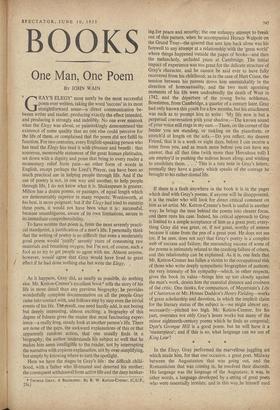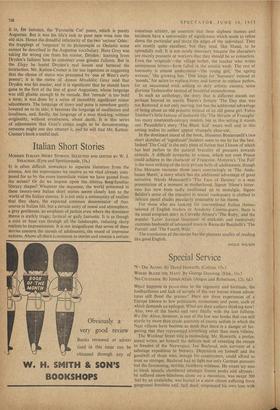BOOKS
One Man, One Poem
BY JOHN WAIN As it happens, Gray did, as nearly as possible, do nothing else.. Mr. Ketton-Cremer's excellent book* tells the story bf his life in more detail than any previous biography; he provides wonderfully complete documentation on all the people Gray came into contact with, and follows step by step even the trivial events of his life. The, result, one need hardly add, is not boring but deeply interesting, almost exciting; a biography of this degree of fulness gives the reader that most fascinating exper4 ience—a really long, steady look at another person's life. There are none of the gaps, the awkward explanations of this or that apparently random action, that one usually finds in a biography; the author understands his subject so well that he makes him seem intelligible to the reader, not by interrupting the narrative with copious explanation, not by over-simplifying, but simply by knowing where to turn the spotlight. Here we have the stages in Gray's life: the difficult child- hood, with a father who ill-treated and deserted his mother; the consequent withdrawal from active life and the deep hanker- 'THOMAS GRAY. A BIOGRAPHY. By R. W. Ketton-Cremer. (C.U.P., 25s.) RAY'S ELEGY' must surely be the most successful poem ever written, taking the word 'success' in its most straightforward sense—a direct communication be- tween writer and reader, producing exactly the effect intended, and producing it strongly and indelibly. No one ever mistook what the Elegy was about, or painstakingly demonstrated 'the existence of some quality that no one else could perceive for the life of them, or complained that the poem did not fulfil its function. For two centuries, every English-speaking person who has read the Elegy has read it with pleasure and benefit: that sonorous, memorable statement of the great human platitudes, set down with a dignity and poise that bring to every reader a momentary relief from pain----no other form of words in English, except perhaps the Lord's Prayer, can have been so much practical use in helping people through life. And if the use of poetry is not, in one way and another, to help people through life, I do not know what it is. Shakespeare is greater; Milton has a dozen poems, or passages, of equal length which are demonstrably superior in many respects; Wordsworth, at his best, is more poignant; but if the Elegy had tried to outstrip these poets, it would not have been what it is : successful. because unambiguous, aware of its own limitations, secure in its immediate comprehensibility.
To have written that poem is, from the most severely practi- cal standpoint, a justification of a man's life. I personally think that the writing of poetry is so difficult that even a moderately good poem would 'justify' seventy years of consuming raw materials and breathing oxygen; but I'm not, of course, such a fool as to try to get people to agree with me. Almost anyone, however, would agree that Gray would have lived to great / effect if he had done nothing else but write the Elegy. , ing.for peace and security; the one unhappy attempt to break out of this pattern, when he accompanied Horace Walpole on the Grand Tour—the quarrel that sent him back alone was his farewell to any attempt at a relationship with the 'great world' where things happened outside the pages of books—and then the melancholy, secluded years at Cambridge. The initial impact of experience was too great for the delicate structure of Gray's character, and he cannot be said ever to have fully recovered from his childhood; as in the case of Hart Crane, the tension between his parents drove him unmistakably in the direction of homosexuality, and the two most agonising moments of his life were undoubtedly the death of West in 1742, and the departure of the young Swiss nobleman, Bonstetten, from Cambridge, a quarter of a century later. Gray had only known this youth for a few months, but his attachment was such as to prompt him to write : 'My life now is but a perpetual conversation with your shadow.—The known sound of your voice still rings in my ears.—There, on the corner of the fender you are standing, or tinkling on the pianoforte. or stretch'd at length on the sofa.—DO you reflect, my dearest Friend, that it is a week or eight days, before I can receive a letter from you, and as much more before you can have my answer, that all that time (with more than Herculean toil) I am employ'd in pushing the tedious hours along, and wishing to annihilate them. . . .' This is a rare note in Gray's letters; normally they have a gaiety which speaks of the courage he brought to his rather dismal life.
In the Elegy, Gray performed the marvellous juggling act which niade him, for that one occasion, a great poet. Midway between the Augustanism that was going out, and the Romanticism that was coming in, he resolved their discords. His language was the language of the Augustans; it was, in Other words, a language developed by a .string of great poets who were essentially ironists; and in this way.he himself used If there is a fault anywhere in the book it is in the pages which deal with Gray's poems; if anyone will be disappointed. it is the reader who will look for direct critical comment on him as an artist. Mr. Ketton-Cremer's book is useful in another way; he brings the man behind the poems into clearer focus, and there rests his case. Indeed, his critical approach to Gray is limited to a simple acceptance of him as a great poet; every- thing Gray did was great, or, if not great, worthy of esteem because it came froth the pen of a great poet. He does not see (or, if he sees, does not say) that Gray's poetry is a complex web of success and failure; the resounding success. of some of the poems is intimately related to the crashing failure of others, and this relationship can be explained. As it is, one feels that Mr. Ketton-Cremer has fallen a victim to the occupational risk , of those who write deeply sympathetic biographies of authors; the very intensity of his syMpathy—which, in other respects, gives the book its value—brings him up too closely against the man's work, denies him the essential distance and coolness of thcl critic. One thinks, for comparison, of Meyerstein's Life of Chauerton or Mr. Homes Duddon's Henry Fielding—works of great scholarship and devotion, in which the implicit claim for the literary status of the subject is—we might almost say, necessarily—pitched too high. Mr. Ketton-Cremer, for his part, overrates not only Gray's lesser works but many of the minor eighteenth-century poems which he finds so congenial; Dyer's Grongar Hill is a good poem. but he will have it a 'masterpiece'; and if this is so, what language can we use of King Lear? it in, for instance, the 'Favourite Cat' poem, which is purely Augustan. But it was his life's task to pour new wine into the old skin. Hence the dreadful inferiority of the two 'serious' Odes: the trappings of 'rorvance' in its picturesque or Ossianic sense cannot be described in the Augustan vocabulary. Here Gray was taking the wrong cue from his master, Dryden : learning from Dryden's failures how to construct even greater failures. But in the Elegy he learnt Dryden's real lesson and bettered the instruction. Mr. Ketton-Cremer is far too ingenious in suggesting that the choice of metre was prompted by 'one of West's early poems'; it is the metre of Annus Mirabilis; Gray said that Dryden was his master, and it is significant that he should have gone to the first of the line of great Augustans, whose language was still pliable enough to be remade. But 'remade' is too bold a term; it was done by a series of incredibly significant minor adjustments. The language of irony and poise is somehow gently lowered on to its side; it becomes the language of meditation and loneliness, and, finally, the language of a man thinking, without originality, without evasiveness, about death. It is this series of adjustments that Gray's critics ought to be demonstrating; someone might one day attempt it, and he will find Mr. Kelton- ' Cremes book a useful tool.











































 Previous page
Previous page